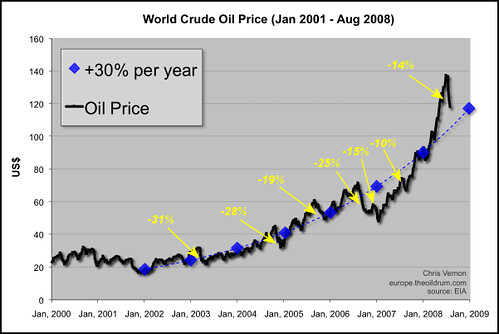It looks like you're using an Ad Blocker.
Please white-list or disable AboveTopSecret.com in your ad-blocking tool.
Thank you.
Some features of ATS will be disabled while you continue to use an ad-blocker.
0
share:
The demand for oil dropped dramatically in the last 6 months. The Energy Information Administration (EIA) of course wants to talk about how much less
oil we're using due to higher prices.
Buried inside of a Reuters news story oddly called Biggest drop in U.S. oil demand in 26 years is the small little detail that oil demand actually increased over the last 6 months by 500,000 bpd (barrels per day). Ha! So the headline is acutally the opposite of what happened. The reality is that while the U.S. cut back on it's oil consumption the rest of the world more than made up for it.
Does anyone here still believe that the oil prices are due to speculation? Of course some still do, but why? As we see in the above example, the less the U.S. consumes the more other countries will consume. This seems to indicate that the prices are indeed demand driven.
While you're dancing in the street over how gas has dropped to the low low prices of $3.80 a gallon, don't forget where it was not too long ago. You also might want to remember that this current market correction is just a temporary setback and not a big one at that.
WASHINGTON (Reuters) - U.S. oil demand during the first half of 2008 fell by an average 800,000 barrels per day (bpd) compared with the same period a year ago, the biggest volume decline in 26 years,
news.yahoo.com...
Buried inside of a Reuters news story oddly called Biggest drop in U.S. oil demand in 26 years is the small little detail that oil demand actually increased over the last 6 months by 500,000 bpd (barrels per day). Ha! So the headline is acutally the opposite of what happened. The reality is that while the U.S. cut back on it's oil consumption the rest of the world more than made up for it.
The drop in U.S. oil demand helped offset a 1.3-million bpd increase in petroleum consumption in nonindustrial countries during the first half of the year.
As a result, preliminary data shows that global oil consumption rose by 500,000 bpd in the six-month period, the EIA said.
Does anyone here still believe that the oil prices are due to speculation? Of course some still do, but why? As we see in the above example, the less the U.S. consumes the more other countries will consume. This seems to indicate that the prices are indeed demand driven.
While you're dancing in the street over how gas has dropped to the low low prices of $3.80 a gallon, don't forget where it was not too long ago. You also might want to remember that this current market correction is just a temporary setback and not a big one at that.
it looks like the Worldwide economy is booming. Sure, China and India are the leaders , with 20% of the worlds population.. I guess it is because of
the globalisation - so it could be that the wealth will be more equal distributed among the worlds nations..
new topics
-
Studies show that watching a beaver eat cabbage lowers stress by 17%
Health & Wellness: 2 hours ago -
Salvatore Pais confirms science in MH370 videos are real during live stream
General Conspiracies: 2 hours ago -
Australia passes social media ban for children under 16
Social Issues and Civil Unrest: 5 hours ago -
James Webb Telescope Takes a Look at the Sombrero Galaxy
Space Exploration: 6 hours ago
0

